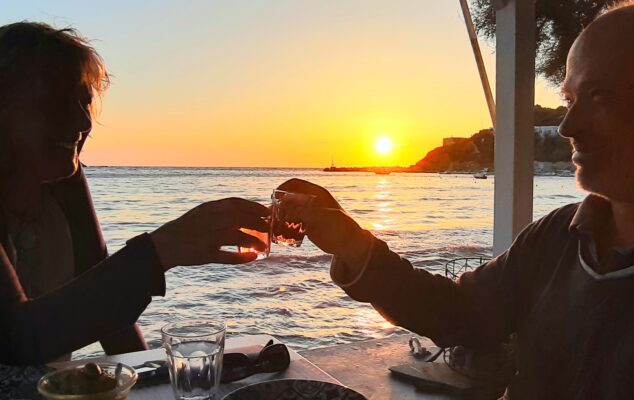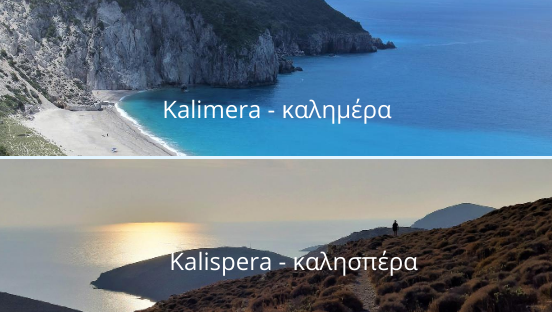Greek Language
Speaking Greek From Day 1
Kalimera!
Would you like to speak some Greek, and be able to have some small conversations in Greek, while you are on holidays in Greece?
Then let’s get started from today! I will just teach you how you can easily start to communicate in Greek, by just greeting somebody in Greek.
It is also genuinely nice to be able to greet in the language of the country you are visiting. For the locals it means you respect them, and you are not just one of those saying “hello” or “hi”. And let’s be honest, it is really not difficult, neither it requires a big effort to memorize some words.
Usually, one of the words every visitor to Greece knows, or can easily memorize, is the word “kalimera” --> Hello, good morning
The good thing in Greek, which I always found very useful myself, is that a lot of Greek words are composed of two separate words, so actually, by learning just one word, without you realizing, you already learned two words.
Some easy examples and Greek words
the word “καλημέρα – kalimera”, means “good day”, and is derived from the following words;
Adjective “kalos” –> good, and the noun “mera” --> day.
The same goes for the word “καληνύχτα – kalinichta”, meaning “good night”, and is composed of the words;
Adjective “kalos” –> good, and the noun “nichta” --> night
(Note, since “mera” and “nichta” are feminine words, you say “kali” and not “kalos” . But in this article I do not explain any grammar, since the purpose here is just to remember some basic Greek words. )
Also, remember that “Kalinichta” is only used when you greet while leaving somebody or going to sleep.
You cannot say it when you just meet somebody in the evening or at night.
In that case, you say “kalispera”!
At what time during the day you use which word?
Kalimera : from the early morning hours till about 1 pm
Kalispera : from about 1pm till 9pm
Kalinichta : when you leave somebody at night or when you go to sleep
If you cannot get used to the fact that those words are used at a different time during the day, then there is another solution!
You can use the word “yia –γεια” the entire day, so that might be even easier. The perfect equivalent for “hello”, but not only!
Take a look at :
The Greek word for health is “igia – υγεία”, but if you shorten it, it becomes “ yia – γεια”.
Since your health is the most important thing of all, the word is used in different ways.
Γεια – yia
– Hello! (Informal: used to greet friends and children)
OR
– Bye! (Formal: used to say goodbye to friends and children)
Γεια σου – yia sou
– Hello! (Informal: used to greet one friend or child)
OR
– Bye! (used to say goodbye to one person, a friend)
It literally means “Health to you”.
Γεια σας – yia sas
– Hello! (used to greet one person in a formal manner or more than one person together)
OR
– Bye! (used to say goodbye to one person in a formal manner or more persons together)
It literally means “Health to you”.
What is the difference between “σου – sou” and “σας – sas”?
If you have English as your mother tongue, and it is not clear to you when to use the formal form or informal form, then here some explanations.
It is important to know the difference in Greek, but do not worry, if you make a mistake, nothing bad will happen! 😊
Greeting somebody is not really that difficult, but just as in other European languages such as French, German, Dutch, Spanish,… it is important to know when you are
expected to greet somebody formally, or at what point you can greet the person as if you are friends.
It is hard to explain in English since the English language has only one form of “you,” regardless of the relationship that you have with the other person.
In many languages, however, there is more than one form of “you,” and so you need to know the difference.
Singular (Γεια σου)
To address one person in an informal situation
• when you greet someone you know well or a close friend
• when you talk to a child
Plural (Γεια σας)
To address several people in any situation or to address one person in a formal situation
• when you talk to several people together, so the plural form
• when you talk to someone who is older than you and who is not a close friend
• when you meet somebody for the first time
• when you are in formal situations: for example greeting your boss, greeting your professor,
doctor, employees at public services, etc.
Also good to know :
While having a drink or dinner with Greeks, you will often hear or say “yia mas” (Cheers).
This phrase literally means “To our health”.
(Στην) γεια μας
– Cheers! “To our health!” (used when drinking together with friends or family).
(Στην) γεια σας
— Cheers! (it is used to say to one person formally, or many persons together “To your health”)
++++++++++++++++++++++++++++
Whenever you are visiting Greece, just try to use those greetings or wishes, and you will witness the most beautiful smiles!
PS. If you would like to learn more, as well as the correct pronunciation, then this online shortcut to speaking Greek “Everyday Greek Language” will teach you exactly what you need to start communicating in Greek.
In the video below Afea explains you a bit more of what you can expect.
This online course is based on my own experiences of which vocabulary and grammar you need to start communicating in Greek, from day one and is made in cooperation with native Greek teachers. Lose your fear of speaking Greek and dare to make mistakes. Speaking Greek from day one makes your stay in Greece so much more fun. And honestly, if I could do it, you can too 🙂
Then start today and enjoy your next visit to Greece to the fullest!


